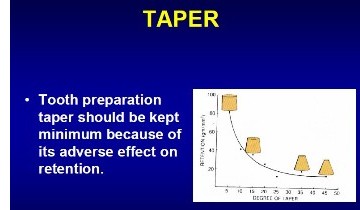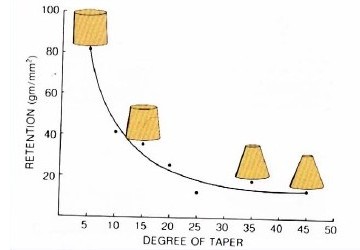I happened across a website the other day, Oral Answers, that had a post, “Six Reasons Why Your Crown Fell Off.” As I read it, in my mind it highlighted the difference between this website and other dental websites. The dentist writing this gave six “politically correct” possible answers that pretty nearly absolve dentists of any responsibility in this mishap and skirt the main cause.
The author of the website appears to be a nice guy. He is a dentist and identifies himself only as Tom. And it’s not that the information is incorrect, it’s just sanitized. It seems to adhere to the philosophy I’ve had preached at me from other dentists, that we professionals need to stick together and defend each other. And so Tom, rather than frankly explain what he was taught in dental school about crowns falling off, instead tries to portray dentists to the patient as nearly infallible.
For me, I can’t bring myself to do that. I need to tell it like it is and let the chips fall where they may. My professional duty, as I see it, isn’t to make other dentists look good but to help the patient.
Here are the six reasons Tom gives, with my comments on each one. Again, they’re all true. It’s just that he leaves off the main reason, which is what he and I were taught in dental school. So after I list and comment on his six reasons, I’ll let you in on a dental school lecture about the main reason crowns actually come off.
We thank our advertisers who help fund this site.
1 – The tooth underneath the crown got decayed.
This will definitely cause the crown to come off. However, if you are having regular checkups, your dentist will spot this decay well before it is extensive enough to cause the crown to fall off.
2 – The cement holding the crown on wasn’t strong enough. This could be due to contamination of the cement while it was being prepared or any number of other reasons. If this is the case, your dentist can usually re-cement the crown back onto your tooth.
This is the closest he comes to faulting the dentist. But he presents this as so easy to fix that it makes the dental mistake easy to forgive. In reality, I would attribute this cause to fewer than 1% of crowns falling off. I don’t think I ever saw a case like this in my practice.
3 – You ate too many chewy foods.
I was never taught in dental school to advise my patients with permanently cemented crowns not to eat chewy or sticky foods, and I never told them that. I will add that in 23 years of practice, I never had a crown that I put on just fall off, and my patients ate jelly bellies, taffy, whatever. I also have eight crowns myself and don’t observe any diet restrictions because of them. But if you do have a borderline crown or a temporary crown, yes, sticky or chewy foods will give you problems.
4 – The crown broke.
Again, this will do it, but it rarely happens. I’m trying to remember if I ever saw a broken crown in my practice. I may have seen one or two over my 23 years. While the porcelain may chip, just chipping won’t cause it to come off. In the old days, some pure porcelain crowns would break if they were used too far back in the mouth.
5 – You abused your crown.
He mentions grinding your teeth or using your teeth as tools. Yes, he is correct, this will stress your crown, but if the crown is done well it won’t be enough to loosen it so that it comes off.
6 – There wasn’t enough tooth structure to hold onto the crown.
Here he’s getting close to the main reason that crowns come off. This happens most often with short teeth. However, we dentists are taught how to address short teeth and get a crown to stay on. There are retentive grooves and other preparation features we can put into the crown preparation to deal with a short tooth.
The Main Reason

Now let’s go to our dental school training. Here are a couple of slides from a dental school lecture. Dr. Al Amri is teaching his students crown retention and resistance forms, the two principles involved in crown preparation that keep the crown on the tooth.
He explains to the students that the greater the taper in the crown preparation, the less likely the crown is to stay on. In his graph, which I have enlarged below, he teaches that by tightening up the taper, the dentist can increase the retention dramatically.
the dentist can increase the retention dramatically.
This seems like a simple solution and you may wonder, then, why every dentist doesn’t just prepare the teeth with minimum taper. There are a couple of reasons. First, to prepare a tooth with minimum taper requires a lot of precision. What if the dentist is off just a little bit? He or she could end up with what is called an undercut. I’ve illustrated that in this small diagram below.  In an undercut, the tooth preparation is narrower
In an undercut, the tooth preparation is narrower  at the bottom than at the top. Having even the slightest undercut makes it impossible to make a crown to fit—it simply won’t slide on the tooth. If there is a small undercut in just one small part of the preparation, the crown won’t work. And the less taper there is in the crown, the more time and effort it takes to tell if you have an undercut.
at the bottom than at the top. Having even the slightest undercut makes it impossible to make a crown to fit—it simply won’t slide on the tooth. If there is a small undercut in just one small part of the preparation, the crown won’t work. And the less taper there is in the crown, the more time and effort it takes to tell if you have an undercut.
The second reason is that the tighter taper makes it harder to seat the crown. The tighter taper, which makes it hard to dislodge the crown once it’s on, makes it harder to get on during the seating appointment. Any irregularity in the surface of the tooth or the internal surface of the crown needs to be resolved. There is less room for error.
A dentist can avoid these issues by simply creating more taper in the crown. And some dentists do just that. They may not be intentionally taking shortcuts—they may just lack confidence in their ability to create a perfect crown, so they just shoot for acceptable, with the result that they have some crowns that end up falling off. In my practice, I always prepared crowns with as little taper as I possibly could, and in 23 years I never had a crown fall off. However, I did see crowns done by other dentists that did come off, and in just about every case these were crowns with inadequate retention form—too much taper.
We dentists, when we talk among ourselves, will talk about this issue of crown retention, and we fully understand that we are pretty much in control. But many dentists, when they are talking to patients, don’t feel the inclination to be quite so honest, for fear it will tarnish the profession. That’s their mindset. But it’s not mine.
Do you have a comment? We’d love to hear from you. Enter your comment below.
Click here to ask Dr. Hall a question of your own.
About David A. Hall
Dr. David A. Hall was one of the first 40 accredited cosmetic dentists in the world. He practiced cosmetic dentistry in Iowa, and in 1990 earned his accreditation with the American Academy of Cosmetic Dentistry. He is now president of Infinity Dental Web, a company in Mesa, Arizona that does advanced internet marketing for dentists.
